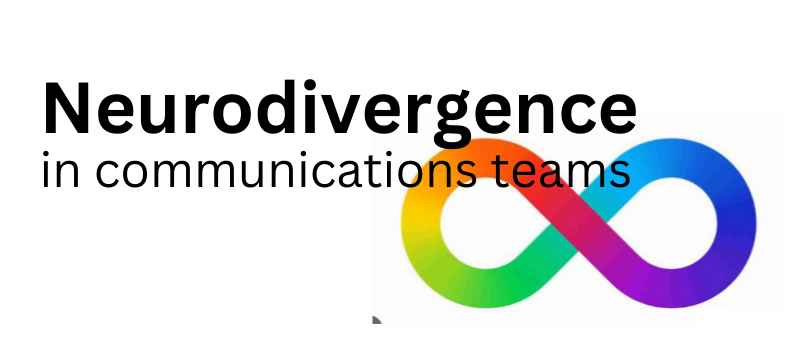Neurodivergence in communications teams

What’s it like being a neurodivergent person working in communications — and how can communication teams make space for neurodivergent people’s gifts and needs? Neurodivergent content strategist Matt Fenwick shares his story.
For the longest time, if you thought about neurodivergent people at work, you’d think of someone like my older brother. Joel is an austistic computer scientist. He’s staggeringly good with numbers. Joel designed anti-piracy software when he was a teenager, while I was in my bedroom drawing superheroes.
My relationship with numbers is tenuous at best. I love words, and ideas, and musing at length. But I’m also neurodivergent — autistic and ADHD. And I’ve chosen to build my career in comms, because that’s where my particular blend of interests and skills find a home. It’s where I feel useful.
I’m not alone. Many neurodivergent folk I know are drawn to comms for various reasons. Some are creatives: spectacularly good at pulling disconnected ideas into something new. Some are editors: bringing a forensic eye to spot the smallest glitch in logic. And some excel at crisis communication: in an emergency, when others buckle under the pressure, they come alive.
But most of them are flying under the radar. I’ve chosen to be very much ‘out’ with my neurodivergence. I run my own company, so I have that freedom. For many, there’s still stigma. An assumption that ADHD people can’t be trusted to follow through. Or that autistic people have no social skills.
These assumptions are no more universally true than saying: “All neurotypical people enjoy making small-talk at barbecues.” But stereotypes are sticky, and they colour the way the community thinks about us. They still colour the way I think about myself.
You may be looking for an article where I comprehensively lay out what neurodivergence is, and give you some robust rules for how to make the most of the gifts that neurodivergent people bring to comms roles.
This isn’t going to be that article, I’m sorry!
Here’s why. Neurodivergent people can be as different from each other as they are from the neurotypical population. There are certainly some common threads, but they’re far from universal.
Neurodivergent people will often differ from the norm in specific areas:
- Social interactions
- Special interests and areas of hyperfocus
- Repetitive behaviour
- Being more (or less) sensitive to sound, touch, noise or light
- Processing information
- Regulating emotions
- Executive function
But which of those areas will show up for a neurodivergent person — and what that looks like for them — that’s wide open.
What I can do is share what’s been most helpful for me in understanding my own experience, diagnosed at the ripe old age of 44.
What neurodivergence means to me
Words have always been my thing. When I was 10, I was given a Collins Dictionary Thesaurus for Christmas, and I rolled around the floor clutching it to my chest with delight. I could write stories for England, but my desk was a bombsite. Making friends didn’t come naturally to me, nor did many other aspects of getting through life.
Those things should’ve been a sign to my family: get that kid tested. But neurodivergence wasn’t as widely understood back then, and I was academically gifted. So I stumbled through life with an ‘absent-minded professor’ tag trailing behind me. Then, in my early 40s, I found myself running hard up against a brick wall in parts of my personal life.
I began thinking: why is it that some things come so easily to me, and others feel almost impossible?
I saw a psychiatrist and was diagnosed with ‘significant’ ADHD. It wasn’t even close.
Understanding neurodivergence
There’s a saying about neurodivergent people: “The hard things are easy and the easy things are hard.” When you line up the things I’m good at — and the things I’m not — you see mountains and valleys.
Folks often talk about neurodivergence as a ‘superpower’. And to be clear, for me, the way my mind works does make it easy for me to do some things blisteringly fast. I synthesise information. See patterns and gaps that others don’t.
But what I see, and it saddens me, is that workplaces are only willing to embrace the parts of neurodivergent people that are useful or entertaining.
I’ve been affirmed for my insights, and embraced for my quirkiness. But those are the parts of me that are immediately and objectively useful.
There is a cost that the ‘superpower’ narrative glides over. My costs are many, but there’s at least one that’s safe to share here because it’s just kinda dorky: I couldn’t reliably button up my shirt until I was well into my twenties. And for me, open plan offices are a special kind of hell, with the visual and auditory distractions they bring.
There are more subtle things too: I need clear structure to define what work I’m doing. To use a musical metaphor, it’s the scale that I improvise around.
Sudden shifts in that structure, or shifts that I’m not consulted on, can really throw me. In a comms environment, when so much work is reactive, I can thrive as long as the basic ways of working and channels of communication are clear. But shift those things, and I feel like I’m lost at sea. That sense of being ‘thrown’ is very common for neurodivergent people.
But when we raise what we need, we often get told that we’re being ‘difficult’. And that breaks our heart. It breaks my heart. Because we really want to help. To be useful. We don’t expect the world to revolve around us. We just want a say in the part of it that affects us.
How to support neurodivergent people in comms
1) Just ask
My neurodivergent colleagues and I don’t expect to be handled with cotton wool. But nor do we appreciate being treated as a ‘type’, with the assumption that because we’re neurodivergent, we’re going to act in a certain way and need certain things. We want to have a pragmatic conversation about what you need, what we need, and what works for both sides.
As you go into these conversations, be mindful of the judgments you make. If you can, avoid using ‘other-centred’ language, like ‘he’s being difficult.’ Instead, frame what you need, like ‘I need a way of being able to change the project approach quickly when new information comes in’.
That creates a safe, neutral space for conversation. For both people to get what they need.
2) Design a team
In comms, there’s a tendency to expect one person to do everything. How many comms role descriptions have you seen that require high-level strategic thinking and proficiency in Adobe Creative Suite?
Because neurodivergent people’s skill profiles often follow that ‘mountains and valleys’ pattern, they may not fit the all-rounder mold. But that doesn’t mean they can’t fit.
If you have a neurodivergent person in your team, think about how they contribute to the whole — and where other team members can support things they struggle with. An example from my own experience: I’m prone to attentional blinks. I have a laser-like focus and then…my mind skips a beat. I’ll miss a typo. So I benefit from having other people check my work. This isn’t laziness, or a lack of care on my part. It’s about the way my disability affects me at work — and what I need to support that.
Neurodivergent people in comms have so much to offer. We want to put our skills to work. With grace, flexibility and an openness to challenge assumptions, comms teams can benefit immensely from our unique way of seeing the world, and the love we have for what we do.

A TEDx speaker, Matt Fenwick is the Founder and Strategy Director at True North Content. He is a content and communications strategist specialising in untangling messy websites and distilling an organisation’s message. Matt is based in Canberra, Australia.
